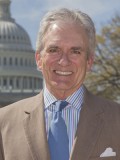 Written by J. Brent Walker, BJC Executive Director
Written by J. Brent Walker, BJC Executive Director
Allow me one more retrospective on the interplay of religion and politics in the 2012 elections.
In my September column, I expressed optimism that we, as a country, were taking more seriously the constitutional principle against imposing a religious test for public office. Noting that for the first time no white Anglo-Saxon Protestant appeared on either ticket of the two major political parties for president and vice president and that the U.S. Supreme Court is composed only of Catholic and Jewish justices, I observed the historic Protestant hegemony at the upper reaches of our federal government had receded — despite the fact that Protestantism continues to be the largest religious tradition in our country.
Now looking back on the election it appears my optimism was well-founded. For all of the talk among evangelical Christians and others that they would never vote for a Mormon, there is no evidence to suggest that Gov. Mitt Romney’s defeat was related to his Mormonism. True, there may be some who refused to vote for him because of his religion and others who did not vote at all for that reason, but President Barack Obama’s margin of victory far exceeds any disability suffered by Gov. Romney because of his religion. We also can take some satisfaction in knowing that the Democratic Party, as well as Democratic-sympathizing political action committees, did not raise Gov. Romney’s religion as an issue in the election.
It also appears that we did a fair job of talking about religion in the public square in a responsible way. As I have argued before, the principle, as well as the letter, of the no religious test clause in Article VI of the U.S. Constitution does not disclaim religion’s relevance to public life. But, it does mean that we should not impose a religious litmus test on our candidates and, when religion is taken into account, consider it only to the extent it directly affects a public policy position entertained by the candidate or impacts the candidate’s fitness to serve in office. With a few highly visible exceptions — e.g., Rev. Robert Jeffress’ brazen condemnation of Gov. Romney’s candidacy based solely on his Mormonism and Rev. Franklin Graham’s veiled endorsement of Gov. Romney because of Graham’s bogus belief that the president is a crypto-Muslim — we did a commendable job in balancing the pertinence of religion to public life with the prohibition on religious tests.
In addition to the unprecedented religious makeup of both the presidential ticket and the Supreme Court and treating religion responsibly in the public square, the outcome in congressional races also gives cause for optimism. (For more, see the cover story from this month’s Report from the Capital)
Two Muslim members of the House of Representatives, Keith Ellison, D-Minn., and André Carson, D-Ind., were re-elected. After serving in the House, Mazie Hirono, D-Hawaii, became the first Buddhist ever to be elected to the Senate. Tulsi Gabbard, D-Hawaii, became the first Hindu to be elected to the House. Finally, Kyrsten Sinema, D-Ariz, was elected to the House as the only self-identified “religiously unaffiliated” member. (Confessed atheist Rep. Pete Stark, D-Calif., served 20 terms in Congress before losing his seat in 2012.)
Moreover, we appear to have come to terms with members of Congress who are not Christian or Jewish taking oaths of office on their own holy books. When Rep. Ellison was first elected and in 2007 opted to take his oath of office on the Quran, a great outcry arose. Many insisted he use the Bible even though he is a Muslim. None of that appeared to happen this year. Rep. Gabbard affirmed her oath on the Bhagavad-Gita, the Hindu holy book; Sen. Hirono opted against placing her hand on any book; and Rep. Sinema chose, appropriately enough, to place her hand on a copy of the U.S. Constitution. Hardly a peep of protest could be heard in opposition to these conscientious practices of these members of Congress.
Am I being Pollyannaish here? I don’t think so. I recognize we continue to have a long way to go. Many still think that we are and should be a “Christian nation,” legally and constitutionally. Islamophobia and anti-Mormon prejudice prevails in many quarters.
However, the fact that an overwhelming Christian majority is willing to elect representatives who reflect America’s vast religious pluralism and astonishing diversity and give them permission to solemnize their introduction to their new position without protest suggests to me that we are making progress.
May we continue to move forward in our thinking and practice. The “no religious test” principle in the Constitution must go hand in glove with the First Amendment’s two religion clauses; they are equally important in protecting religious liberty in a nation whose religious tapestry is becoming increasingly mottled.
From the January 2013 Report from the Capital. Click here for the next article.





